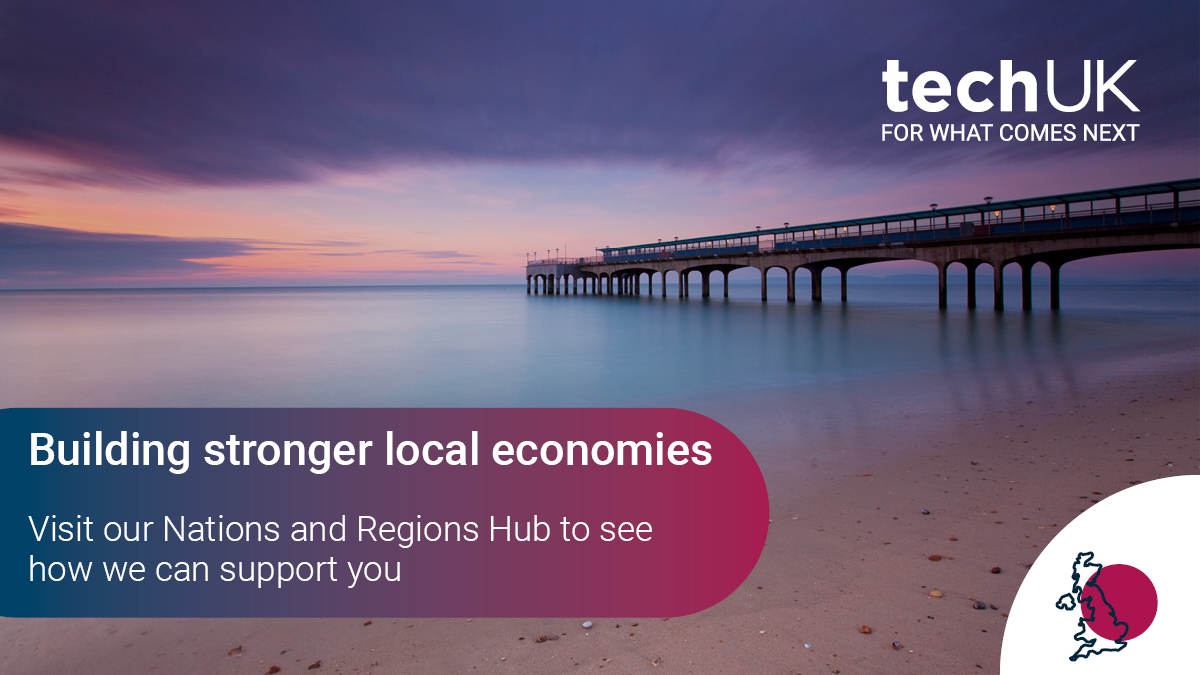Striking the Balance for Scottish Tech’s Future
As we reach the end of 2023, I’ve been reflecting on business investment and progress in 2023 and thinking ahead to what we need to focus on next year. I can’t help but feel that it’s been a year of contradictions. It seems that there is a lot of optimism and investment in some sectors and regions in the UK, yet I look around and see businesses continuing to battle with inflationary pressures, access to the right skills and talent and increasing payroll costs.
As an eternal optimist, I often lean towards the positive narrative, but I wanted dig further into some of these contradictions and test whether the sentiment is backed up by data.
I’ve been involved with lot of regional projects this year, including the techUK Local Digital Index, which benchmarked the regions across the UK against seven different measures from digital skills and infrastructure to finance and investment. This report was a powerful method of highlighting the regional disparity that we see in access to, and option of, technology; but also, the financial opportunity available to lower scoring regions when trying to lift their GVA.
So, on one hand we see disparity, but on the other we see opportunity. If we combine the six regions with the lowest GVA and try to get them up to the UK median, it would generate an additional £4.8bn for the economy, and crucially, to those regional economies.
If we look at Scotland in particular, we saw Edinburgh and Glasgow score amongst the top third in every component, which is fantastic. But the flip side is looking at the increasing divide between the rural and urban areas across the country. Whilst we see real progress in digital infrastructure in the cities, rural areas remain significantly behind, which is hampering their chances to benefit from the digital economic opportunity.
The report also highlighted that Scotland boasts the highest number of students studying computing, tech and engineering, per 1000 students in the UK. Attracting digital skills into Scotland and nurturing that home-grown talent is key to solving the digital skills problem faced internationally. However, at DIGIT Scotland last week we heard Toni Scullion, a passionate Computing Science teacher and founder of dressCode, talking us through the declining number of High School pupils studying computing science, which is further compounded by a chronic shortage of teachers. These pupils are a large part of our future talent pool and it is vital for us to reverse this downward trend if we want to build a nation of digitally skilled graduates, apprentices and school leavers, who want to continue to live and work in Scotland.
At a business level, the techUK report highlighted that Scotland recorded an 80% increase in tech companies in the last decade alone. This, coupled with the progression of Mark Logan’s recommendations and the TechScaler programme, positions us well for the future. In terms of investment a lot us been happening, we have seen the investment zone status for Glasgow and the North East of Scotland that will generate £80m for each region over the next five years; Ayrshire and Borderlands were both awarded status as a UK 5G innovation zone, sharing part of a£36m funding pot, and the UK’s first next-generation supercomputer is to be hosted at Edinburgh University. The computer – one of only a handful of its kind in the world – is funded by the Department of Science, Innovation and Technology through UK Research and Innovation (UKRI). It will be managed by EPCC, the University’s supercomputing centre and housed in a new £31 million wing of EPCC’s Advanced Computing Facility, which has been purpose-built as part of the Edinburgh and South East Scotland City Region Deal. Additionally, the Chancellor has just announced that the Government will invest £500m over the next two years in the UK, following the success of the supercomputing centres in Edinburgh and Bristol.
So, it's clear that investment in Scotland is high and there is a real buzz in the tech community here. However, I work with many SMEs across a wide variety of sectors in Scotland. These businesses don’t often share the same sense of optimism or indeed benefit from the same investment as those in the tech sector. We often hear people say that ‘every business is a tech business in Industry 4.0’. But that’s not what I hear from some of these SMEs in retail, manufacturing and the third sector who are struggling to survive in the current economic climate.
These are the businesses who desperately want to adopt innovative digital solutions if they bring operational optimisation or help them tap into lucrative new market opportunities. However, they struggle to access the right digital skills and justify the investment with competing cost pressures. This is why techUK recommended support for the SME’s as one of their key policy recommendations to the Government in the Local Digital Index report. It’s also why the British Chamber of Commerce lobbied for full expensing of capital allowances which has been announced by the Chancellor in his Autumn budget. With the majority of British Businesses falling into the SME category, these are the businesses who need the most support to help return to growth.
So, whilst I will remain an optimist going into 2024, I will do so with a clear focus on the areas that I believe need improvement. We must address the urban/rural digital divide and we must support the growth of our SME’s. If we can do that whilst simultaneously growing out digital skills and leveraging the investments, we are seeing in the Scottish tech sector, then we have every right to feel positive about the year ahead.

techUK – Building Stronger Local Economies

techUK champions the tech sector throughout the UK. We work with local authorities, devolved government, and local and national policy makers to advocate for the tech sector in strengthening economic growth and resilience. We provide opportunities for our members and local stakeholders to meet, build relationships, and collaborate to drive forward local projects. For more information or to get in touch, please visit our Nations and Regions Hub and click ‘contact us’.
Upcoming Nations and Regions events:
Latest news and insights:
Nations and Regions updates
Sign-up to get the latest updates and opportunities from our Nations and Regions programme.
Contact the team:
Learn more about our Nations and Regions campaign:










